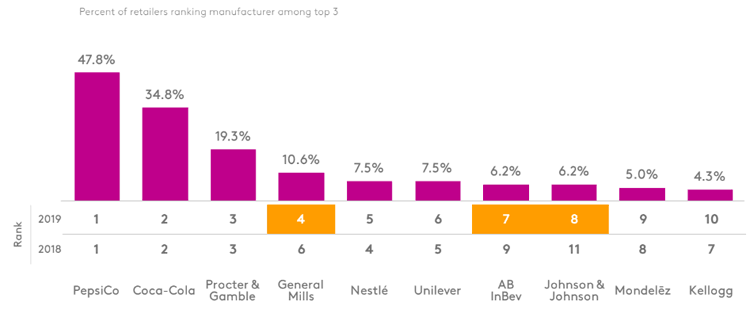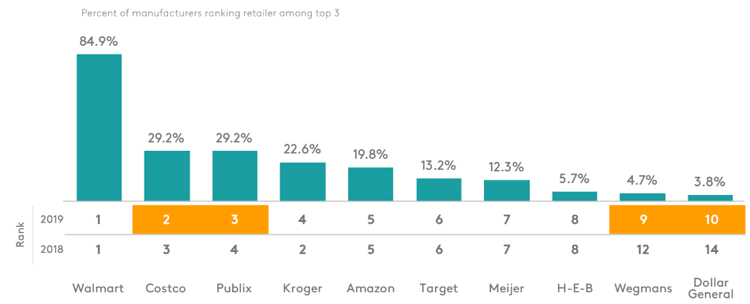Last summer as usual, I summarized both the results and the methods used by Gartner to compile its famous Top 25 Supply Chain list for 2019, right after it was published. Gartner has added on to an approach first started by the former AMR Research in 2004, after Gartner acquired AMR in 2009.
The top 25 list of course generates much interest, and companies that make it naturally tout that honor. As I noted in my column, I occasionally get calls from companies looking for advice on how to make the top 25.
Let me first say that I do not have a better way to compile a top supply chain list than the way Gartner does it. Only limited information is available for analysis – no one is sharing cost information, as just one example.
Gilmore Says.... |
 |
Ratings from counterparts at trading partners seems about as good an input that you can get to gauge supply chain excellence.
|
 |
What do you say? |
|
| Click here to send us your comments |
| |
|
|
|
That said, there are a number of critiques that I think can be fairly leveled at the process. Those include:
Only large companies of $12 billion or greater revenue are considered.
The way the financial metrics are used does not necessarily connect with supply chain excellence. Does Apple's huge revenue growth really stem primarily from supply chain excellence? Should McDonald's benefit in the rankings because its business model with outsourced food service providers and daily deliveries give it a huge number of inventory turns versus most companies? Even the return on assets metric gives advantage to companies that have outsourced their supply chains and thus have a lower assets base. But that strategy doesn't necessarily deliver a superior supply chain.
Even the so-called peer rankings, under which about 160 persons (I assume Gartner clients) ranked the top supply chains (well not really the best supply chains, but those that are tops in "demand driven value network orchestration," a rather unclear criterion) is a bit suspect. How does anyone really know whether say pharma compant Novo Nordisk (which made the top 25) has a better supply chain than say Target stores (which did not)? Is the ranking based on just public perception, vested interests in the outcome, something else?
The same observation could be made for the 38 Gartner analysts that performed a similar company ranking. These analysts clearly have a broader view of supply chain activities than the average peer group participant, but not even these experts could possibly really know how to rank performance across 300 supply chain candidate companies.
Finally, 10% of the Gartner total formula is now comprised of a corporate social responsibility (CSR) score obtained from third party sources. CSR may be a good thing, but certainly many aspects of these CSR scores are disconnected from what we normally think of as supply chain performance.
I think these are all fair critiques, yet I understand Gartner's position in terms of a lack of other data and and no obvious way to address these questions.
Well, there is actually is another way. That is to directly ask companies that should be in the know about the supply chain performance of other companies, as they have on-going experience as trading partners.
That is the approach that Kantar Consulting) has been taking for many years in its annual PoweRanking report, the latest of which was delivered in late 2019.
The full study covers a number of company performance measures for both consumer goods manufacturers and retailers, including such areas as brand power, marketing programs, sales teams, overall business fundamentals, and more. Supply chain management is one of the categories included in the survey.
The rankings for this year, as always, were developed through the interesting methodology of asking retailers to rate manufacturers on each of these categories, and manufacturers to rank retailers on a similar set of attributes. .
Both manufacturers and retailers are mostly from the consumer packaged goods, food and beverage areas. That means manufacturers in such categories as apparel/soft goods, electronics, hard goods, etc., are not included. Similarly, the participating retailers are drawn exclusively from sectors such as mass merchandise, traditional grocery, warehouse clubs, convenience and drug store chains that focus on consumer packaged goods sales, and does not for example include department stores or most specialty retail areas.
Most major CPG companies and retailers take part, with about 80 retail company participants and 50 manufacturers.
For the last few of years, however, Amazon.com has been included in the retail group. And this year, such companies as Ace Hardware, Newell Brands, and Kohl's participated, though they are outside CPG.
The scores represent the percentage of respondents that place a given manufacturer or retailer as having one of the top three supply chains in the industry.
So the analysis pool is limited to CPG type companies and their retail channel partners. That said, below are the top rated consumer goods supply chains for 2019:
Top CPG Supply Chain from Kantar PoweRanking Report 2019

Just to be clear, the results say that 47.8% of retailers placed PepsiCo as having one of the top three CPG supply chains, as did 34.8% of retailers for number 2 Coca-Cola, etc.
Interesting, as always – and naturally leading me to wonder how these results compare to the Gartner Top 25.
Among the top rated overall supply chain across all companies by Gartner were CPG manufacturers Unilever and Procter & Gamble, placed in a separate class called "supply chain masters" for long term excellence. P&G is number 3 and Unilever number 6 on the Kantar ranking
Those two companies aside, Colgate-Palmolive was the number 1 ranked supply chain across all companies by Gartner, but alas Colgate does not even make the Kantar top 10 list of just CPG manufacturer supply chains, as rated by their retail customers.
There are other such discrepancies. Nestle is the second ranked CPG supply chain in the Gartner list, but number 5 in Kantar, just behind General Mills, which is no where in the Garter top 25.
A somewhat similar story on the retail side, though the comparisons are more difficult:
Top Select Retailer Supply Chain from Kantar PoweRanking 2019 Report

Walmart runs away with it, with a 84.9% score. On Gartner, Amazon has also been placed in the supply chain masters
category, and thus was not included in the actual top 25 for 2019. But in the Kantar rankings, based on CPG company ratings, Amazon is number 5, behind Walmart, Costo, Publix and Kroger and just ahead of number 6 Target.
Of those five retail companies on Kantar (top six minus Amazon), only Walmart made the Gartner top 25. Target gets some justice in the Kantar rankings, in my opinion. It could be the retailers don't make the Gartner top 25 due to lower profit margins than the manufactuters, and have a tougher time driving revenue growth through acquisitions.
How to reconcile these differences? Don't know. The methodologies are totally different, so different results should be expected. But ratings from counterparts at trading partners seems about as good an input that you can get to gauge supply chain excellence.
Thanks to Kantar for again supplying me with its report, which is not publicly available.
What is your reaction to these comparisons between the Garnter and Kantar lists? How would you improve the Gartner approach? Let us know your thought at the Feedback section below.
Your Comments/Feedback
|